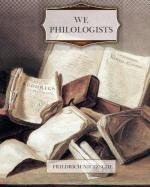47
It is not true to say that we can attain culture through antiquity alone. We may learn something from it, certainly; but not culture as the word is now understood. Our present culture is based on an emasculated and mendacious study of antiquity. In order to understand how ineffectual this study is, just look at our philologists . they, trained upon antiquity, should be the most cultured men. Are they?
48
Origin of the philologist. When a great work of art is exhibited there is always some one who not only feels its influence but wishes to perpetuate it. The same remark applies to a great state—to everything, in short, that man produces. Philologists wish to perpetuate the influence of antiquity and they can set about it only as imitative artists. Why not as men who form their lives after antiquity?
49
The decline of the poet-scholars is due in great part to their own corruption: their type is continually arising again; Goethe and Leopardi, for example, belong to it. Behind them plod the philologist-savants. This type has its origin in the sophisticism of the second century.
50
Ah, it is a sad story, the story of philology! The disgusting erudition, the lazy, inactive passivity, the timid submission.—Who was ever free?
51
When we examine the history of philology it is borne in upon us how few really talented men have taken part in it. Among the most celebrated philologists are a few who ruined their intellect by acquiring a smattering of many subjects, and among the most enlightened of them were several who could use their intellect only for childish tasks. It is a sad story . no science, I think, has ever been so poor in talented followers. Those whom we might call the intellectually crippled found a suitable hobby in all this hair-splitting.
52
The teacher of reading and writing, and the reviser, were the first types of the philologist.
53
Friedrich August Wolf reminds us how apprehensive and feeble were the first steps taken by our ancestors in moulding scholarship—how even the Latin classics, for example, had to be smuggled into the university market under all sorts of pretexts, as if they had been contraband goods. In the “Gottingen Lexicon” of 1737, J. M. Gesner tells us of the Odes of Horace: “ut imprimis, quid prodesse in severioribus studiis possint, ostendat.”
54
I was pleased to read of Bentley “non tam grande pretium emendatiunculis meis statuere soleo, ut singularem aliquam gratiam inde sperem aut exigam.”
Newton was surprised that men like Bentley and Hare should quarrel about a book of ancient comedies, since they were both theological dignitaries.
55




